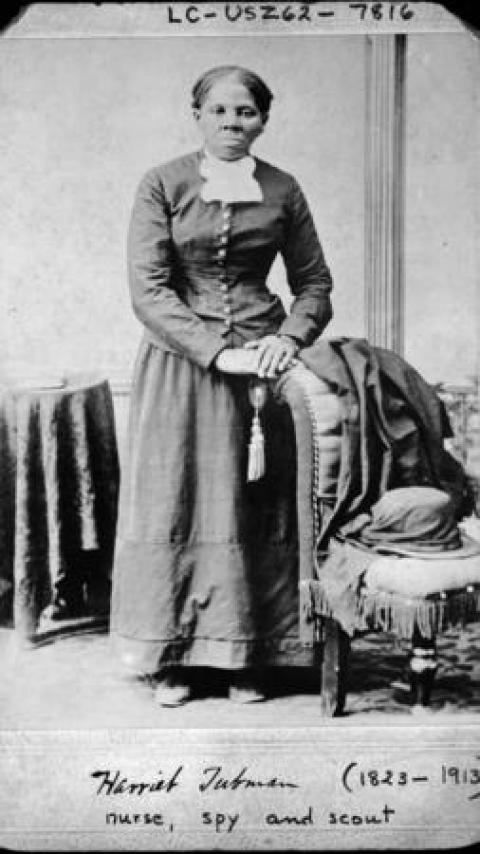The Women on 20s campaign has declared that America needs the face of a woman on its currency and that woman should be abolitionist Harriet Tubman. The campaign petitioned the federal government this week after Tubman won an online poll that featured 15 historic women — including Eleanor Roosevelt, Rosa Parks and Susan B. Anthony — as candidates to replace Andrew Jackson on the $20 bill. As a feminist, I think this campaign is well-intentioned. Women are rarely acknowledged as important contributors to the creation and development of the United States, and Tubman especially is regularly overlooked. I even named her on my own list of candidates, initially. But I was hesitant to support Women on 20s’s goals from the beginning, and now that Tubman has been selected, I’m certain: There’s no place for women – especially women of color – on America’s currency today.
Harriet Tubman dedicated much of her life to subverting the system of forced labor and oppression that built America’s economy. Born Araminta “Minty” Ross, she spent her youth enslaved in Maryland. In one of her first of many acts of defiance, she changed her name to honor her mother, Harriet, after marrying a free black man. In doing so, she created her own identity outside of being a “slave.” Then, after escaping from a plantation to Philadelphia, she made numerous journeys back to the South to help liberate black people from the bondage of American chattel slavery. In a lesser known act of defiance, Tubman served as a spy during the Civil War, alerting the Union Army to slaves who would join its fight if rescued. Her information launched the Combahee Ferry raid that freed hundreds of people. Tubman was one of America’s first female war heroes and is known as the only woman to lead a raid for the Union Army.
On one hand, replacing the face of Andrew Jackson – a man whose wealth was made on the backs of enslaved black people – with Tubman’s image sounds like an idyllic reversal of fortune. But in examining Tubman’s life, it’s clear that putting her face on America’s currency would undermine her legacy. By escaping slavery and helping many others do the same, Tubman became historic for essentially stealing “property.” Her legacy is rooted in resisting the foundation of American capitalism. Tubman didn’t respect America’s economic system, so making her a symbol of it would be insulting.American capitalism historically has been used to oppress and disenfranchise women and people of color.
At various points in our nation’s history, women were forbidden from owning property, married women were forbidden from working, and black women were restricted to jobs as cooks and maids. Even today, economic injustice continues in the form of unequal pay, limiting women’s ability to reach their full economic potential. For every dollar a white man earns from his labor in the United States, white women earn 78 cents, black women earn 64 cents, and Hispanic women earn just 54 cents. This isn’t a result of a lack of effort to rise up. Even with a college degree, black women earn less than white men without one. Single black women have a median net worth of just $100.America’s currency is viewed as a place to honor people of historic political influence.
To suggest that black women are part of that club by putting Tubman’s face on the $20 simply would cover up our nation’s reality of historic and lingering disenfranchisement. Of the 104 women in the House of Representatives, only 18 are black, and only one black woman has sat in the U.S. Senate since the nation was founded. Of the 78 women in executive statewide offices, just one is a black woman. There’s no doubt that black women have a political representation problem in America. But putting the face of an admired black American heroine on currency won’t fix it – it will only mask it.
If having Harriet Tubman’s face on the $20 bill was going to improve women’s access to said bill, I’d be all for it. But instead, it only promises to distort Tubman’s legacy and distract from the economic issues that American women continue to face. While adding representation of women to an area historically dominated by men can be encouraging and boost women’s morale, the symbolism risks masking inequalities that are far more important.
Harriet Tubman did not fight for capitalism, free trade, or competitive markets. She repeatedly put herself in the line of fire to free people who were treated as currency themselves. She risked her life to ensure that enslaved black people would know they were worth more than the blood money that exchanged hands to buy and sell them. I do not believe Tubman, who died impoverished in 1913, would accept the “honor,” were it actually bestowed upon her, of having her face on America’s money. And until the economic injustice against women in America ends, no woman should.


Spread the word